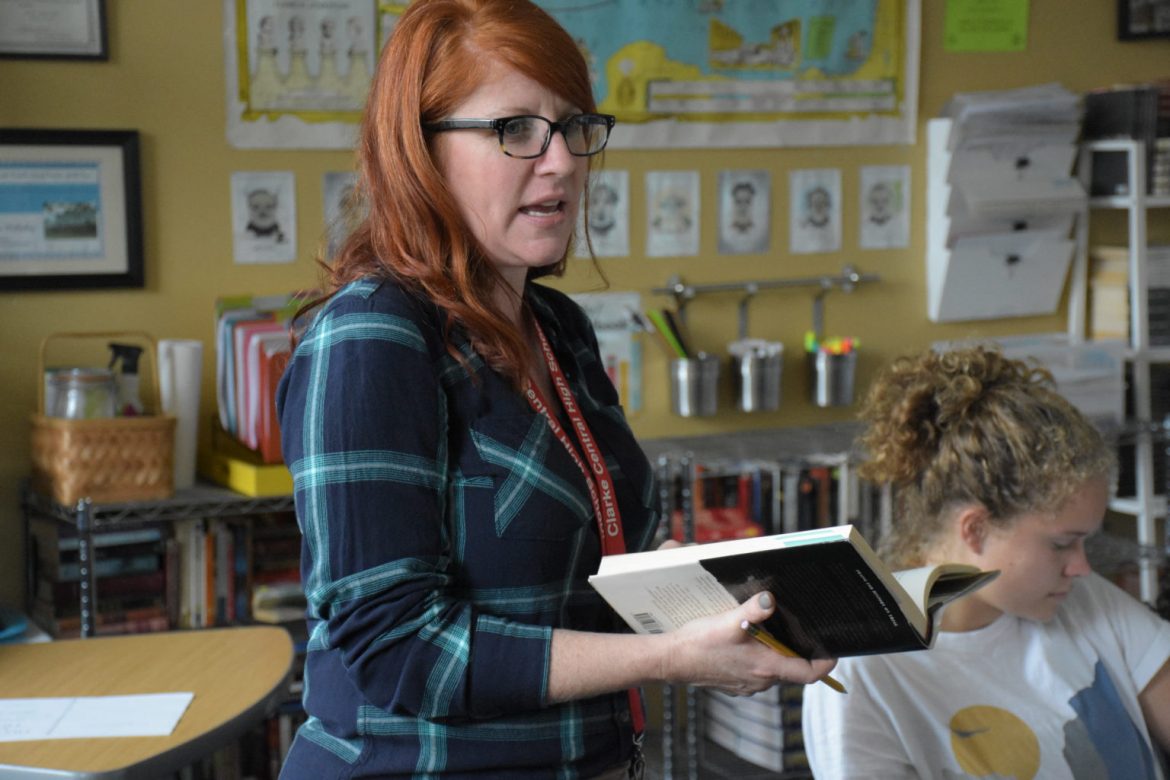Clarke Central High School English department teacher Meghan McNeeley reads the book “History On Trial” by Deborah E. Lipstadt to her sixth period Multicultural Literature/Composition class on Nov. 5. McNeeley designed a curriculum for the class that focuses on the Holocaust. “Technically, (the class) is about the Holocaust,” McNeeley said. “It’s supposed to be more about various cultures, but I’m able to teach about the Holocaust by looking at the different cultures impacted. It’s kind of my specialty.” Photo by Colin Frick
Clarke Central High School English department teacher Meghan McNeeley is teaching the Multicultural Literature/Composition class with a focus on Holocaust literature and history.
The Multicultural Literature/Composition elective is being taught at Clarke Central High School in the 2018-19 school year for the first time since 2011. According to the Clarke County School District Program of Study, the class, “focuses on world literature by and about people of diverse ethnic backgrounds.”
The course was last taught by former CCHS English department teacher Marlana Street in 2011. Chloe Alexander, a 2013 CCHS graduate, was a student in Street’s class and believes its focus on female authors was beneficial to her experience in later literature classes.
“It was really important for us to be reading feminist literature, even though (Street) didn’t put that label on it,” Alexander said. “When I went to college (at Georgia Tech) and ended up taking women’s literature classes, classes where they were using the feminist label, I realized (Multicultural Literature/Composition) was a very social justice-oriented class.”
For Alexander, the class enlightened her about the perspectives of those from other cultures, not only through the literature they read, but also through the opinions of her classmates.
“There was a student in class who was a Bosnian exchange student,” Alexander said. “He was raised as a child by his Christian parents to believe that the Holocaust was not truly the tragedy that it’s made out to be, that it is an exaggeration. And that was a particularly challenging thing because we were reading ‘Night,’ (by Holocaust survivor Elie Wiesel), and I remember (Street) had to address it with the class and be like, ‘You know, some people were raised to believe some things, and it doesn’t necessarily mean you are a bad person, it’s just we all come from different backgrounds and we are products of our environments.’”
Prior to being offered his current position as Family Engagement Specialist, former CCHS English department teacher Christian Barner was scheduled to teach the class during the 2018-19 school year. Barner had an open-ended vision for how he wanted to teach the class.
“The first thing we were going to do was look at culture and identity and look at how those two things intersect and how someone’s culture affects them as an individual,” Barner said. “The idea would be to first have students write cultural autobiographies where (they) dissect and analyze their own culture to make sure every student understands they each have different cultures.”
According to English department teacher Meghan McNeeley, who was chosen to teach Multicultural Literature/Composition in Barner’s place, she was selected to teach the course due to her expressed interest in teaching a class about Holocaust-related themes.
“When I interviewed (for a job at CCHS), I let the interview committee know that one of the reasons I was coming up here (from Clarke Middle School) was that I wanted to teach a Holocaust literature course someday,” McNeeley said. “It’s multicultural, but it’s looking through the lens of all the cultures that were affected (by the Holocaust).” McNeely routinely holds class discussions with her students, examining the effects of the Holocaust from multiple angles.
“Right now we’re doing a study on black people in the Holocaust: how small that group was in Germany in general, and then how they were targeted and how that was different from how Jewish people and the larger groups were targeted,” sophomore Stella Perkins said.
Members of the class study not only the short-term effects of the Holocaust, but the long-term effects and how they relate to present-day issues.
“When we were doing an activity, we had to look at the numbers of Jewish people in each country be fore and after the war, and that was kind of crazy,” Perkins said. “There was a website we were on and (we were) just reading about that and how the population shifted because of how many people were killed.”
While studying how black people were affected by the Holocaust, class discussions about modern acts of racism have also surfaced.
“We got into discussions about how we see race, how it reflects on Americans and what are some of the issues in our society today with the way African-Americans, particularly males, are being treated,” McNeeley said.
McNeeley hopes to teach about as many affected groups as possible, while also focusing on those of the Jewish faith.
“We’re starting with the group that had the smallest number of affected victims, and we’re going from there to the largest,” McNeeley said. “If we talked about the effect on the Jews first, that would be the only one we study because it was by far the largest. So we’ve started (with) African-Germans, and then we’re gonna work our way up to the Jews.” While McNeeley has always found the Holocaust to be an interesting subject to learn about, she is driven to teach about the Holocaust in Multicultural Literature/Composition because of her personal beliefs on the subject.
“It can happen again. Seems to (me) there are some similarities politically right now between then and now. Things like anti-semitism, (and a shooting in a synagogue in) Pittsburgh,” McNeeley said. “It’s very reminiscent and kind of scary.”
